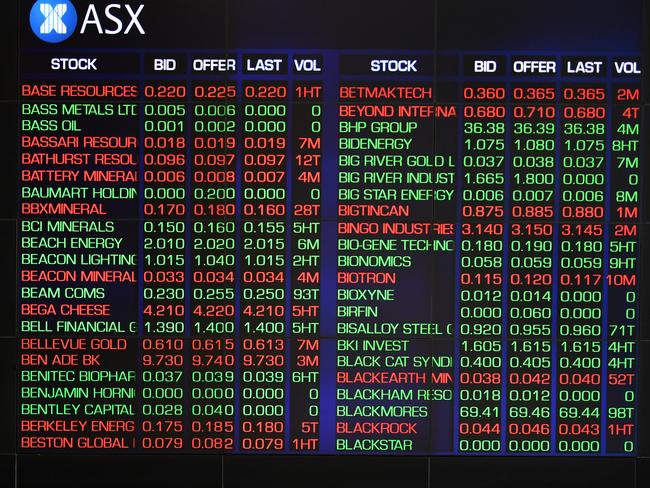ASX market plunge explained: What Australian investors should do depending on their age
Australians should not panic about the massive falls to the sharemarket. Instead they should rethink their investment strategies. This is what to do depending on your age.
Saver HQ
Don't miss out on the headlines from Saver HQ. Followed categories will be added to My News.
Australians have been warned not to “panic sell” their shares and make rash decisions following a disastrous week on the nation’s sharemarket.
Share portfolios and super fund balances took a massive hit after the nation’s benchmark ASX200 index plunged by 9.8 per cent last week and wiped $210 billion from its value.
On Friday alone 3.4 per cent was struck off worth $65.1 billion, leaving many investors in disbelief – the largest daily fall in 11 years.
The core cause of the falls is blamed on the global coronavirus outbreak, which has also seen the massacring to global markets including Wall Street after they experienced one of their worst trading sessions since 2011.
But calm is needed and as the world’s smartest finance guru Warren Buffett famously once said: “be fearful when others are greedy and greedy when others are fearful”.

JBS Financial Strategists chief executive officer Jenny Brown warned Australians “not to put all the assets in one asset class” right now.
“Don’t kneejerk and make sure you speak to your adviser – we are on the phones and emails talking to clients to help and alleviate their fear,” she said.
“That’s what we saw in the GFC, clients who didn’t kneejerk and came out the other side were in a really good position while those who panic sold, it took a lot longer to recover.”
Robo-adviser Six Park’s director of business development, Ted Richards, said if you had a long investment horizon and were aware of the risks, “stay invested and ignore the noise”.
“The fog of vocality can make investors veer off course in their investment goals,” he said.
MILLENNIALS (20s/30s)
For younger Australians in their 20s and 30s, there’s certainly no reason to stress about the state of the stockmarket in the short term, but instead to rethink your financial strategy, Mr Richards said.
He believes long-term investment plans are key, not short-term ones.
“If we are talking about millennial investors and they are trying to get into the property market they should have more of a conservative portfolio that won’t have the volatility of the stock market,” he said.
“You would want a much larger allocation in your portfolio to defensive asset classes like cash, bonds, fixed income and infrastructure as opposed to Aussie and international equities.”
The reason being the returns are lower but the risks are far less.

Jess Cosaitis, 25, who works in marketing and his partner Tess Walker, 26, who is a vet nurse, recently purchased their first home for $580,000 in Mickleham in Melbourne’s north.
Mr Cosaitis said he was concerned by the plummeting sharemarket but they remained focused on paying down their mortgage.
“I’m not too concerned about on the impact on my super but I’m more concerned about the impact on buying my house and what will happen with interest rates,” he said.
“I’m putting extra into my home loan so I don’t have crippling debt if things do take a turn for the worst.”
Mr Cosaitis salary sacrifices into his super in the hope of fattening his nest egg for later in life.
Property prices have rebounded in Australia and latest Core Logic figures showed the national home value index climbed by 0.9 in January alone.
Sydney and Melbourne continued as the leader for capital gains increasing by 1.1 and 1.2 per cent in the first month of the year.
GEN X (40s/50s)
For those heavily invested in the sharemarket, InvestSMART’s chief market strategist Evan Lucas said shares would “still continue to outperform any other asset classes”.
“If you are in your 50s you are getting closer and closer to retirement, it means that you should be starting to minimise the debt you hold,” he said.
“You should also be reviewing the way your investments are, if you want to preserve the capital you should be moving down your equities into fixed income.”

But Mr Lucas said it was also important Australians in this age bracket considered pumping extra into their super because the tax breaks made it enticing to do so.
It is critical to be edging towards retirement minus mortgage debt.
“If you are in your 40s and 50s, the closer you are to the top end of that bracket you should be paying down your debt,” Mr Lucas said.
“The further you are away from your late 50s you should be thinking about your super and longer term investments.”
MORE NEWS
Aussie car giant probes massive cyber hack
Irate Freedom Furniture customers given reprieve
What $1 of electricity gets you
Why Aussie kids are getting more pocket money
RETIREES (60+)
For Australians who are in or close to their retirement phase JBS Financial Strategists’ Jenny Brown said having a “knee jerk” reaction to sharemarket falls wasn’t wise.
“For those who are fully invested in a diversified portfolio and are not sitting on a lot of cash, they are investing for the long term,” she said.
“We are taking a five to 10 year time horizon and they should be investing in quality assets, there’s no need for panic selling.”
Ms Brown said having a well-rounded and diversified share portfolio would still be able to deliver retirees returns from dividends and cash from term deposits they hold.

She said retirees should ideally try and have at least two to three years’ worth of pension payments or living expenses sitting in cash so they can weather any downward spirals.
“If you are 65 or 70 you have still got 30 years to invest for so you don’t want to be putting all your money in cash and earning 1.5 per cent,” Ms Brown said.
“If people start knee jerking to sell, we are actually talking to clients about not necessarily buying right now but going into the market next week.”
Ms Brown said buying quality stocks was important to maintain a good income stream and as for property said she “two years ago the property market was flat” so this was not necessarily the best option to invest in.

